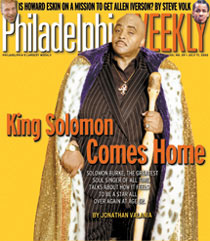 Solomon Burke is the Muhammad Ali of soul. He is widely considered to be the greatest male soul singer of all time by those who have made the genre their life’s work–critics, DJs, A&R; people. The competition is formidable: James Brown, Al Green, Otis Redding, Sam Cooke and lots of others. And then, as if to fix the crown on his head more securely, they add, “with a borrowed band,” which is to say, “with one hand tied behind his back.”
Solomon Burke is the Muhammad Ali of soul. He is widely considered to be the greatest male soul singer of all time by those who have made the genre their life’s work–critics, DJs, A&R; people. The competition is formidable: James Brown, Al Green, Otis Redding, Sam Cooke and lots of others. And then, as if to fix the crown on his head more securely, they add, “with a borrowed band,” which is to say, “with one hand tied behind his back.”
This is not news to Burke. Born 62 years ago in West Philadelphia, Burke was raised on the belief that he was royalty, that he was chosen for a higher purpose. Indeed, he would one day take over the twin family businesses of sanctifying the living and burying the dead. Friends and family called him “the Bishop.” And after a stretch of living on the streets when the bottom fell out of his early singing career, he studied to become a doctor of mortuary science.
His birth was augured in a dream his grandmother had 12 years prior to his arrival. A deeply religious woman, Eleanora A. Moore–known around town as Mother Moore–started Solomon’s Temple: The Church of God for All People in preparation for his arrival and imminent ascendancy to the pulpit.
Burke was preaching by age 7 and had his own radio ministry by the time he was 12, taking to the road in the form of a holy roller tent show, saving souls up and down the eastern seaboard. Sanctified but never sanctimonious, Burke described his ministry in Peter Guralnick’s Sweet Soul Music as the “Church of Let It All Hang Out,” preaching the core values of “God, money and women, hey, hey, hey; truth, love, peace and get it on.”
The ’60s was his golden era, his rise dovetailing with the creative and commercial fortunes of soul music. In the early part of the decade, he more or less kept Atlantic Records in business with an impressive string of R&B; chart-toppers like “Just Out of Reach (of My Two Open Arms)” and “Cry to Me.”
But by the ’70s soul music was by and large a spent force. Although the hits stopped coming, Burke continued to record and work the lucrative oldies and gospel circuit–referring to this period as the “throne in exile.” His return has been a slow train coming, but it has finally pulled into the station.
Burke was inducted into the Rock and Roll Hall of Fame last year. A few weeks back Entertainment Weekly named him the “It” soul legend. He recently signed with the Fat Possum/ANTI posse–a vibrant offshoot of the punk-focused Epitaph label. ANTI has had great success attracting legendary artists–people like Tom Waits and Merle Haggard–and giving them the time and the space to do what they do best without commercial pressures, resulting in late-career albums of uncommon artistic purity.
You can now add Burke to the list. Next week Fat Possum will release his gorgeously rendered and aptly titled Don’t Give Up on Me, featuring songs penned for him by the likes of Elvis Costello, Brian Wilson, Bob Dylan, Tom Waits, Dan Penn, Van Morrison and Nick Lowe. It floats like a butterfly and stings like a bee; it’s got Grammy written all over it. At age 62, Solomon Burke, a giant of a man in body and soul–the sire of 21 children and grandfather of 63–has never sounded more exalted.
The king is back on his throne.
Philadelphia Weekly: There is some discrepancy as to whether you were born in 1940 or 1936.
Solomon Burke: March 21, 1940, in the city of West Philadelphia at 38th and Mount Vernon at the address of 3036 Mt. Vernon St. They were having church downstairs; I was born upstairs. I don’t even think they heard me, trombones and all that stuff playing in that little house–wasn’t easy to hear a little baby crying.
�
PW: Your grandmother had a dream about you 12 years before you were born?
SB: My grandmother was a highly respected spiritual medium, a woman of God. Mother Moore. If you had a problem you came to her and prayed with her. The kind of woman who, if you didn’t have no food, would say, “Well, honey, I was just cooking some food for you,” and hand you the pots right off the stove. She had the United Praying Band–all these different women from churches–come together on Thursday nights and pray for the sick, pray for the world. My godfather, the late Daddy Grace, started the United House of Prayer. I lived a wonderful, beautiful life in West Philadelphia.
�
PW: Legend has it that she set up the Church of God For All People 12 years before you were born and it was her belief that you would arrive and take it over.
SB: She believed that I would be the first child bishop. I had no idea what a bishop was; I was just having a good time. My uncle was playing the piano and I was singing. They gave me a fish box to stand on and a cape and two pieces of chicken–and I was preaching. Gave my first sermon when I was 7, had a radio ministry when I was 12 on WHAT-AM, an R&B; and gospel station.
�




